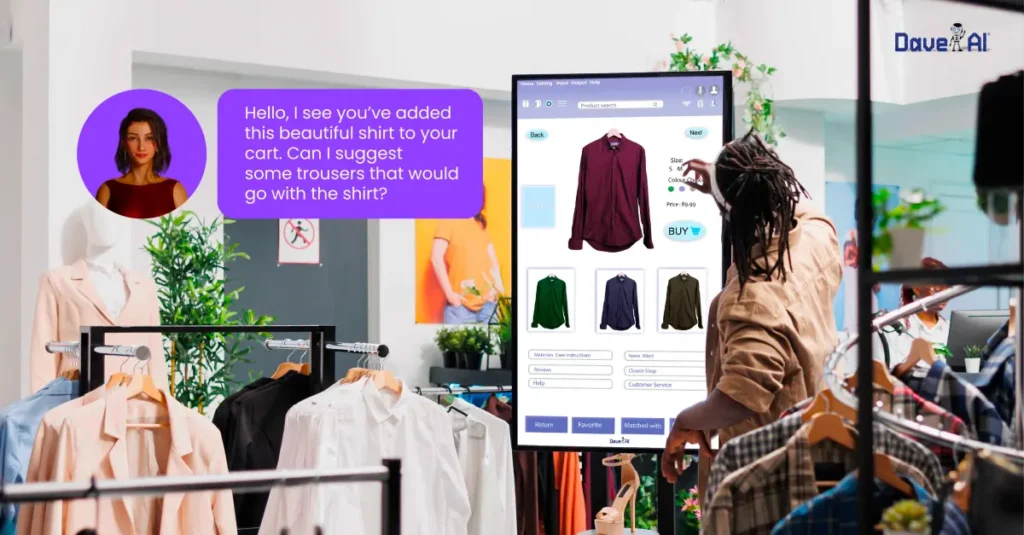We’ve all heard the saying, “A picture is worth a thousand words,” but when it comes to retail, a good conversation can be priceless. That’s where conversational AI comes into play. With advancements in technology, businesses have many ways to boost their customers’ user experience, one of which is offering personalized shopping experiences that were once unimaginable. This approach is quickly becoming a game-changer in e-commerce, and it’s clear why.
In the United States alone, the market for conversational AI is already valued at over $2.09 billion, and that number is likely even higher by now. As AI-powered chatbots become more common in retail, this trend is expected to keep growing. So, what changes have we already seen? How are AI-driven chatbots benefiting businesses, both big and small? And how is this shaping the shopping experience? Let’s take a closer look at these questions and explore the impact conversational AI is having on the retail world.
What is Conversational AI?
Conversational AI in retail refers to technology that helps businesses connect with shoppers through smart chatbots. These virtual assistants can handle tasks like answering customer questions, providing personalized product suggestions, and gathering feedback. They are available 24/7, making it easier for customers to get the help they need at any time.
Studies show that over half of consumers regularly use AI-powered chat services for simple tasks like finding the right products online. The popularity of these chatbots has grown because they offer a practical and efficient way to improve the shopping experience. Retailers are finding that using Conversational AI helps them meet customer needs quickly, while also gathering valuable insights to improve their services.

Benefits of Conversational AI in Shopping
1. Interactive Content Consumption
In recent times, the retail sector has been increasingly using digital content to boost sales. With more people browsing the internet on mobile devices, businesses are making the most of digital platforms and social media to showcase their products. A good example of this is Google’s move to test retail features on YouTube. They are adding product prices and recommendations below videos, so users can easily click and buy what they see.
Conversational AI plays an important role in this shift. Chatbots and voice assistants can help guide customers through their shopping journey. From answering questions to providing detailed product information, these AI tools make it easier for people to find what they need and complete their purchase. Plus, video-based retail has the potential to really take off with the help of AI, making the shopping experience more seamless.
With the growing popularity of video content, businesses can show off their products in action, giving customers a better idea of what they’re buying. To reach an even wider audience, adding closed captions to these videos is a great move. Captions allow people with hearing impairments to follow along, but they also help in cases where viewers watch videos without sound. This can make your content accessible to a larger group of potential customers, regardless of their location or preference.
2. Gain Actionable Insights with AI Data-mining/Inventory Management
In the retail world, there’s a constant flow of activity. Every time a customer makes an inquiry, requests a service or makes a purchase, a lot of data is created in a very short time. By using AI-powered assistants, retailers can collect and analyze this data to understand customer behavior better. These tools can track patterns from past interactions and provide valuable insights into what customers prefer, how they make decisions, and even what might influence their future choices. With this information, businesses can get a clearer picture of upcoming trends in the market, helping them make smarter decisions and develop strategies that align with what their customers want.
3. Increase in Sales
Using conversational AI can lead to a noticeable rise in sales. With AI helping guide customers through their shopping experience, they get quick answers, personalized recommendations, and a smoother buying process. This not only improves customer satisfaction but also helps customers make quicker decisions, often leading to more purchases. By being available 24/7, AI assistants ensure that no potential sale is missed, even outside regular business hours. This kind of support builds trust with customers, encouraging them to return and make more purchases in the future.
4. Tailored Shopping Experiences
Another major benefit of conversational AI is its ability to create personalized shopping experiences. With the help of AI tools like chatbots, businesses can collect data about customers’ preferences and shopping habits. This allows companies to offer tailored product recommendations that feel more relevant to each individual.
For example, when a customer interacts with a retail chatbot, the AI can remember past purchases or preferences and suggest items that are likely to interest them. This kind of personalized service creates a more enjoyable shopping experience, as customers feel like the brand understands their needs. It also boosts the chances of making a sale since the suggestions are aligned with the shopper’s tastes.
5. 24×7 Availability
Conversational AI brings a significant advantage to shopping by offering round-the-clock customer service. In the past, customers had to wait for regular business hours to get help, but with conversational AI, they can now access support at any time, day or night. Whether it’s tracking an order, asking about a product, or getting recommendations, AI-powered chatbots provide quick and useful responses, allowing businesses to assist their customers instantly. This has made shopping experiences more convenient, as customers don’t have to wait for a representative or deal with long response times, ensuring they get the help they need when they need it.

Closing Thoughts
As conversational AI continues to evolve, it’s clear that it’s reshaping how we shop. From personalized recommendations to 24/7 support, these tools are helping businesses better connect with customers. As this technology grows, we can expect even more changes in the retail experience. The future of shopping looks more interactive and customer-focused than ever.
Emilie Brown
Emilie Brown works with the Content Marketing team at Continual Engine, a leading AI-based accessibility solutions provider, which enables organizations to create digitally accessible content in compliance with universal accessibility laws. Her approach and methodology are simple, concise, and to the point and connect with readers seeking solution-driven content on topics related to accessibility and remediation. Apart from working, she loves to spend time with her dog, volunteer, and play her guitar.



